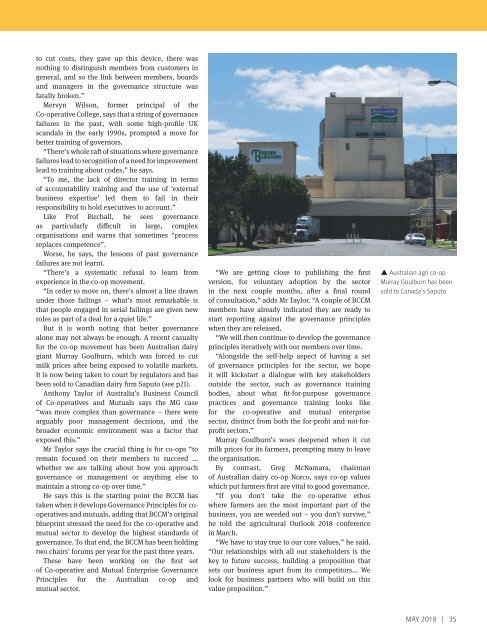MAY 2018
The May 2018 edition of Co-op News: connecting, challenging and championing the global co-operative movement. This issue shines a spotlight on governance – and how co-operatives do it differently. We also look at co-ops on the agenda in Westminster, sustainability supporting and preview some of the motions being put to the vote at the Co-op Group AGM.
The May 2018 edition of Co-op News: connecting, challenging and championing the global co-operative movement. This issue shines a spotlight on governance – and how co-operatives do it differently. We also look at co-ops on the agenda in Westminster, sustainability supporting and preview some of the motions being put to the vote at the Co-op Group AGM.
Create successful ePaper yourself
Turn your PDF publications into a flip-book with our unique Google optimized e-Paper software.
to cut costs, they gave up this device, there was<br />
nothing to distinguish members from customers in<br />
general, and so the link between members, boards<br />
and managers in the governance structure was<br />
fatally broken.”<br />
Mervyn Wilson, former principal of the<br />
Co-operative College, says that a string of governance<br />
failures in the past, with some high-profile UK<br />
scandals in the early 1990s, prompted a move for<br />
better training of governors.<br />
“There’s whole raft of situations where governance<br />
failures lead to recognition of a need for improvement<br />
lead to training about codes,” he says.<br />
“To me, the lack of director training in terms<br />
of accountability training and the use of ‘external<br />
business expertise’ led them to fail in their<br />
responsibility to hold executives to account.”<br />
Like Prof Birchall, he sees governance<br />
as particularly difficult in large, complex<br />
organisations and warns that sometimes “process<br />
replaces competence”.<br />
Worse, he says, the lessons of past governance<br />
failures are not learnt.<br />
“There’s a systematic refusal to learn from<br />
experience in the co-op movement.<br />
“In order to move on, there's almost a line drawn<br />
under those failings – what’s most remarkable is<br />
that people engaged in serial failings are given new<br />
roles as part of a deal for a quiet life.”<br />
But it is worth noting that better governance<br />
alone may not always be enough. A recent casualty<br />
for the co-op movement has been Australian dairy<br />
giant Murray Goulburn, which was forced to cut<br />
milk prices after being exposed to volatile markets.<br />
It is now being taken to court by regulators and has<br />
been sold to Canadian dairy firm Saputo (see p21).<br />
Anthony Taylor of Australia’s Business Council<br />
of Co-operatives and Mutuals says the MG case<br />
“was more complex than governance – there were<br />
arguably poor management decisions, and the<br />
broader economic environment was a factor that<br />
exposed this.”<br />
Mr Taylor says the crucial thing is for co-ops “to<br />
remain focused on their members to succeed ...<br />
whether we are talking about how you approach<br />
governance or management or anything else to<br />
maintain a strong co-op over time.”<br />
He says this is the starting point the BCCM has<br />
taken when it develops Governance Principles for cooperatives<br />
and mutuals, adding that BCCM’s original<br />
blueprint stressed the need for the co-operative and<br />
mutual sector to develop the highest standards of<br />
governance. To that end, the BCCM has been holding<br />
two chairs’ forums per year for the past three years.<br />
These have been working on the first set<br />
of Co-operative and Mutual Enterprise Governance<br />
Principles for the Australian co-op and<br />
mutual sector.<br />
“We are getting close to publishing the first<br />
version, for voluntary adoption by the sector<br />
in the next couple months, after a final round<br />
of consultation,” adds Mr Taylor. “A couple of BCCM<br />
members have already indicated they are ready to<br />
start reporting against the governance principles<br />
when they are released.<br />
“We will then continue to develop the governance<br />
principles iteratively with our members over time.<br />
“Alongside the self-help aspect of having a set<br />
of governance principles for the sector, we hope<br />
it will kickstart a dialogue with key stakeholders<br />
outside the sector, such as governance training<br />
bodies, about what fit-for-purpose governance<br />
practices and governance training looks like<br />
for the co-operative and mutual enterprise<br />
sector, distinct from both the for-profit and not-forprofit<br />
sectors.”<br />
Murray Goulburn’s woes deepened when it cut<br />
milk prices for its farmers, prompting many to leave<br />
the organisation.<br />
By contrast, Greg McNamara, chairman<br />
of Australian dairy co-op Norco, says co-op values<br />
which put farmers first are vital to good governance.<br />
“If you don’t take the co-operative ethos<br />
where farmers are the most important part of the<br />
business, you are weeded out – you don’t survive,”<br />
he told the agricultural Outlook <strong>2018</strong> conference<br />
in March.<br />
“We have to stay true to our core values,” he said.<br />
“Our relationships with all our stakeholders is the<br />
key to future success, building a proposition that<br />
sets our business apart from its competitors... We<br />
look for business partners who will build on this<br />
value proposition.”<br />
p Australian agri co-op<br />
Murray Goulburn has been<br />
sold to Canada’s Saputo<br />
<strong>MAY</strong> <strong>2018</strong> | 35


















